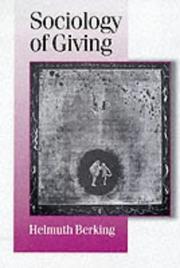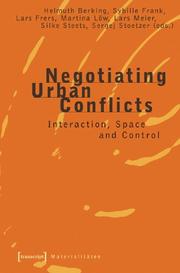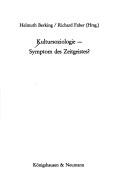| Listing 1 - 4 of 4 |
Sort by
|

ISBN: 0761956492 0761956484 1446217833 9786612623080 1282623087 0857026135 1848609795 0585348863 9780857026132 9781848609792 9781446217832 9780761956488 9780761956495 9781282623088 9780585348865 Year: 1999 Publisher: London : SAGE,
Abstract | Keywords | Export | Availability | Bookmark
 Loading...
Loading...Choose an application
- Reference Manager
- EndNote
- RefWorks (Direct export to RefWorks)
This study questions the view that contemporary societies are dominated by self-interest, and constructs a moral economy beyond the rationale of the market place. It is suitable for students and academics of sociology and cultural anthropology.
Sociology of culture --- Generosity --- Self. --- Générosité --- Moi (Psychologie) --- Moral and ethical aspects. --- Social aspects. --- Aspect moral --- Aspect social --- Gifts --- Self interest --- Social aspects --- Moral and ethical aspects --- #SBIB:309H504 --- #SBIB:309H503 --- 392 --- Code en boodschap: sociologische, antropologische benadering --- Semiotiek, semiologie --- Zeden en gebruiken in het particuliere leven --- Generosity -- Moral and ethical aspects. --- Generosity - Social aspects. --- Generosity -- Social aspects. --- Gifts - Social aspects. --- Gifts -- Social aspects. --- Self interest. --- Manners & Customs --- Anthropology --- Social Sciences --- 392 Zeden en gebruiken in het particuliere leven --- Self-interest. --- Générosité --- Giving --- Donations --- Presents --- Conduct of life --- Self --- Economic man --- NIMBY syndrome --- Manners and customs --- Free material --- Magnanimity --- 392 Customs, manners, usage in private life --- Customs, manners, usage in private life --- Gifts - Social aspects --- Generosity - Social aspects --- Generosity - Moral and ethical aspects

ISBN: 3839404630 3899424638 Year: 2006 Publisher: Bielefeld transcript Verlag
Abstract | Keywords | Export | Availability | Bookmark
 Loading...
Loading...Choose an application
- Reference Manager
- EndNote
- RefWorks (Direct export to RefWorks)
Cities have always been arenas of social and symbolic conflict. As places of encounter between different classes, ethnic groups, and lifestyles, cities play the role of powerful integrators; yet on the other hand urban contexts are the ideal setting for marginalization and violence. The struggle over control of urban spaces is an ambivalent mode of sociation: while producing themselves, groups produce exclusive spaces and then, in turn, use the boundaries they have created to define themselves. This volume presents major urban conflicts and analyzes modes of negotiation against the theoretical background of postcolonialism. »Unter dem Strich: ein in Teilen sehr inspirierender, insgesamt empfehlenswerter Sammelband.« Fred Krüger, Erdkunde, 1 (2007) Besprochen in: https://preservedstories.com, 25.01.2021
Sociology --- City. --- Neoliberalism. --- Place. --- Postcolonialism. --- Social Inequality. --- Sociology. --- Space. --- Urban Studies. --- Urbanity. --- Conflict; Postcolonialism; City; Space; Place; Urbanity; Social Inequality; Neoliberalism; Urban Studies; Sociology --- Urbanization --- Sociology, Urban --- Land use --- Economic aspects --- Land --- Land utilization --- Use of land --- Utilization of land --- Economics --- Land cover --- Landscape assessment --- NIMBY syndrome --- Conflict --- Postcolonialism --- City --- Space --- Place --- Urbanity --- Social Inequality --- Neoliberalism --- Urban Studies

ISBN: 3884794086 Year: 1989 Publisher: Würzburg Königshausen und Neumann
Abstract | Keywords | Export | Availability | Bookmark
 Loading...
Loading...Choose an application
- Reference Manager
- EndNote
- RefWorks (Direct export to RefWorks)
Culture --- Sociology --- Philosophy --- Methodology
Book

ISBN: 3518771361 Year: 2018 Publisher: Berlin : Suhrkamp Verlag,
Abstract | Keywords | Export | Availability | Bookmark
 Loading...
Loading...Choose an application
- Reference Manager
- EndNote
- RefWorks (Direct export to RefWorks)
Long description: In diesem Band geht es um den Zusammenhang zwischen einerseits der Globalisierung und andererseits dem Rechtsradikalismus, dem Rechtspopulismus sowie dem separatistischen Regionalismus in den westlichen Demokratien. Vor dem Hintergrund, dass die Weichen für die politischen Katastrophen im 20. Jahrhundert durch die gesellschaftlichen Umbrüche im 19.Jahrhunden gestellt worden sind, sollen diese Schattenseiten der Globalisierung näher beleuchtet werden. Die internationalen Beiträge analysieren die ökonomischen, kulturellen und politischen Globalisierungs- sowie Fragmentierungsprozesse, untersuchen in Fallbeispielen die autoritären Entwicklungen in Europa und den USA und fragen abschließend nach deren Zukunftschancen in der nationalstaatlich verfassten Demokratie. Biographical note:
Wilhelm Heitmeyer, geboren 1945, war von 1996 bis 2013 Direktor des Instituts für interdisziplinäre Konflikt- und Gewaltforschung der Universität Bielefeld und arbeitet dort jetzt als Forschungsprofessor. In der edition suhrkamp gab er u. a. die Reihe Deutsche Zustände heraus.
Klaus Dörre ist Professor für Arbeits-, Industrie- und Wirtschaftssoziologie an der Friedrich-Schiller-Universität Jena.
Michael Zürn, geboren 1959, ist Direktor der Abteilung »Global Governance« am Wissenschaftszentrum Berlin und Professor für Internationale Beziehungen an der Freien Universität.Claus Leggewie, geboren 1950, ist Direktor des Kulturwissenschaftlichen Instituts in Essen und Mitherausgeber der Blätter für deutsche und internationale Politik.
Wilhelm Heitmeyer, geboren 1945, war von 1996 bis 2013 Direktor des Instituts für interdisziplinäre Konflikt- und Gewaltforschung der Universität Bielefeld und arbeitet dort jetzt als Forschungsprofessor. In der edition suhrkamp gab er u. a. die Reihe Deutsche Zustände heraus.
Wilhelm Heitmeyer, geboren 1945, war von 1996 bis 2013 Direktor des Instituts für interdisziplinäre Konflikt- und Gewaltforschung der Universität Bielefeld und arbeitet dort jetzt als Forschungsprofessor. In der edition suhrkamp gab er u. a. die Reihe Deutsche Zustände heraus.
| Listing 1 - 4 of 4 |
Sort by
|

 Search
Search Feedback
Feedback About UniCat
About UniCat  Help
Help News
News